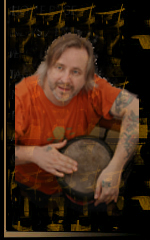 Interview
with: Making Music
Interview by: Geoff Nicholls
From Portsmouth dock worker to Indian percussion star, Pete
Lockett talks to Geoff Nicholls about depression, luck, determination, and a bit
of praxis...
Pete Lockett is one of Britain's
most versatile percussionists. His sessions include Kula Shaker,
Björk, Mel C, and the most
recent Bond films. He's a specialist in Indian percussion, and has recently toured with
his own Network Of Sparks - a multi-cultural percussion group
featuring Bill Bruford, the Ghanaian Nana
Tsiboe, classical percussionist Simon Limbrick and Johnny Kalsi from Dhol Foundation.
Pete grew up in Portsmouth, in "a house with no
music". By the age of 19 he was working in the docks with no particular aim.
Then one day he passed a drum shop and something made him book a lesson. "It was the
first thing that clicked in my life. Spatially and intellectually it made total sense. All
my energy went into getting it together."
"Two years later I moved to London - it was all or
nothing. I was on my own for nine months in a hideous basement flat in Finsbury Park which
had been used as a concrete store. I don't know how I survived. Mega-depression."
But Pete's second turning point soon arrived. At a friend's
place one summer evening the sounds from a Festival of India
concert at Alexandra Palace floated through the open window.
Soon after Pete began tabla lessons via Haringey Adult Education.
"You don't really get a sound for about a year - it
bears no resemblance to what you hear on records. It's very strenuous on the psyche...
Then after three years I got into the South Indian double-ended Mridangam."
"The Indian system is certainly the most intricate in
the drumming world. In some ways it's backwards: we talk about 1-2-3-4 but they direct
everything conceptually towards that first beat, the tihai. It's taken me a long time to
get the information and I want to share it. There's a lot of demystifying which needs to
be done."
"Indian drumming is a specialist thing - you don't get
many non-Indian people turning up. My idea is to mix it with lots of things, bring people
from different cultures and play music in the space between. Create a situation where
people are slightly out of their territory and can't just sit and do their African or
Western thing, etc. Everyone's got to compromise and then they're trying to find new ways
of making music."
This desire inspired Network Of Sparks. Pete says, "You
often see contemporary classical percussion groups adding a bit of world music and there's
no beef behind it. I thought, 'What about coming from the other angle - having the beef
and adding the classical element and then the African and ndian thing as well." This
is just the latest of Pete's spirited collaborations - there's been a Rhythm Sticks Festival duo with James Bond composer David Arnold, and another, ongoing, duo - Taiko
To Tabla - with Joji Hirota.
"It's interesting to go from heavy Japanese 'biceps
exploder' drumming into tabla playing. They're almost completely antithetical approaches.
With Joji there's two eight minute pieces, and that position [sitting bolt upright with
your arms in the air]... It nearly kills your body doing the Japanese stuff, and it kills
your mind doing the Indian stuff."
Pete's obviously devoted years of sweat to practising. But
his third turning point came when he saw there was more to music. "I heard an album
called 'Spirits' by [pianist] Keith Jarrett. He'd
played everything on it like tablas with mallets, and I threw it away. A year later I
heard it again and loved it. I realised he was making great music on drums without any
traditional technique. That made me think about the importance put on playing technically,
trying to prove to others you can play something, maybe from feeling inadequate.
"I love technique, but it's not the key ingredient. A
lot of clinics drummers play against the audience - they try to be untouchable. People
judge you that way: oh it's not technical enough, he didn't scare me. I think that's a
mistake. At the end of the day I think it's about developing philosophically - praxis
and poesis [after philosopher Emmanuel Kant]. Poesis is an action that contains a goal
outside of itself - playing music to be rich or pull birds, etc. It's almost a negative
state of bad faith with yourself. Whereas praxis is an action which contains its own goal.
To relate it to the people, which is fundamentally what music is about - community and
sharing." Geoff Nicholls

RETURN TO INTERVIEWS /
PRESS MAIN PAGE
 |
